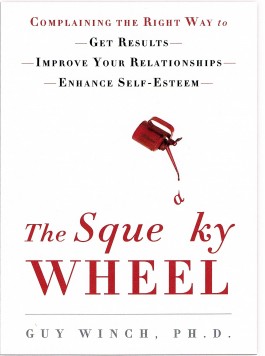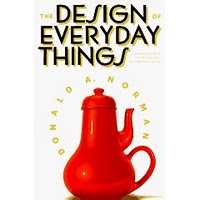Twitter and "The Squeaky Wheel"
Twitter is great for connecting people and ideas. I've described my Twitter versus Facebook experiment on this blog previously which showed that Facebook was far superior in terms of the degree of interaction and engagement compared with Twitter. However, I'm finding benefits that are unique to Twitter. While Facebook is good for reconnecting with old friends, I'm finding a particularly valuable benefit of Twitter is meeting interesting new people and engaging with them. A case in point is Dr. Guy Winch and his book "The Squeaky Wheel: Complaining the right way to get results, improve your relationships, and enhance self-esteem". Guy followed up on a Tweet I sent out about a Life Habits podcast episode which led to a DM discussion about his book. He subsequently sent me the book. I read it, loved it, and suggested to Guy that he be a guest on my podcast. We just did that podcast together with Guy providing some insightful quotes about complaining effectively and going through a top 10 list of the essence of the material in his book. The advice he gave in the podcast is practical and extremely valuable if you only listened to the podcast and took action on his advice during it. Of course, you'll get even more value if you buy and read his book. You can listen to the podcast episode via iTunes, on the shownotes site, or you can discuss it on the new Facebook page. You can also visit Guy's site to learn more about him and how to get hold of his book.
this blog previously which showed that Facebook was far superior in terms of the degree of interaction and engagement compared with Twitter. However, I'm finding benefits that are unique to Twitter. While Facebook is good for reconnecting with old friends, I'm finding a particularly valuable benefit of Twitter is meeting interesting new people and engaging with them. A case in point is Dr. Guy Winch and his book "The Squeaky Wheel: Complaining the right way to get results, improve your relationships, and enhance self-esteem". Guy followed up on a Tweet I sent out about a Life Habits podcast episode which led to a DM discussion about his book. He subsequently sent me the book. I read it, loved it, and suggested to Guy that he be a guest on my podcast. We just did that podcast together with Guy providing some insightful quotes about complaining effectively and going through a top 10 list of the essence of the material in his book. The advice he gave in the podcast is practical and extremely valuable if you only listened to the podcast and took action on his advice during it. Of course, you'll get even more value if you buy and read his book. You can listen to the podcast episode via iTunes, on the shownotes site, or you can discuss it on the new Facebook page. You can also visit Guy's site to learn more about him and how to get hold of his book.
Going Digital for Free
Many aspects of our lives have been going digital over the past few years. A typical knee-jerk response to a question is to simply Google it. I consider Google an appliance for my brain given how often I use it in this way. The majority of people now listen to music in the form of MP3s using an iPod, iPhone, or some other personal audio device. Many also watch digital movies on their computer screens or increasingly on their TV screens too. News is increasingly consumed in digital form via websites, blogs, Twitter, Facebook, or podcasts. Books are now often read on dedicated devices such as a Kindle or directly on devices like iPhones and iPads and alternatively listened to as audio books in the way that music is listened to.
to a question is to simply Google it. I consider Google an appliance for my brain given how often I use it in this way. The majority of people now listen to music in the form of MP3s using an iPod, iPhone, or some other personal audio device. Many also watch digital movies on their computer screens or increasingly on their TV screens too. News is increasingly consumed in digital form via websites, blogs, Twitter, Facebook, or podcasts. Books are now often read on dedicated devices such as a Kindle or directly on devices like iPhones and iPads and alternatively listened to as audio books in the way that music is listened to.
I'm an early adopter of most things digital and have consumed content almost exclusively in digital form for the past few years. I've been paying for much of this digital content though whether through iTunes for music and movies, audible.com for audio books, and amazon.com for eBooks. I was reflecting the other day on the fact that I used to borrow books, music, and movies from the public library, the physical versions of these things. I thought it was an amazing tax-supported way of simply borrowing media for the time period you needed it. I remember checking periodically with the library to see if they were moving into the digital world and was routinely disappointed to learn that they weren't. In fact, I found it extremely frustrating that I couldn't even access the online catalog because all the computers were being used by people accessing their email!
You can imagine my delight when I recently checked with my public library website and found that they now provide digital media and the ability to download and transfer it directly to your media device (an iPhone in my case). The media stays on your device for the loan period and automatically disappears after that leaving you extra space on your device. They offer music, movies, ebooks, and audio books. Since finding this new free resource about a couple of weeks ago, I've already listened to four audio books. I'd recommend that you check out your local public library website to see if yours has digital content for download as well.
Influential Books on Design
I've been interested for some time in getting other people's perspectives on a number of topics but most recently on the topic of the most influential books on design. So, I asked the foll owers of my @ibmdesign and @karelvredenburg Twitter accounts the question, "What's the most influential book you've read on design that you'd recommend to others?" I received a number of really good responses so thought I'd share them here. I've decided to include the additional words people used in describing their books. It is interesting to note that five people mentioned books by Donald Norman with the first four recommending "The Design of Everyday Things" and the fifth recommending his more recent "Emotional Design". The rest of the list includes some pretty interesting books some of which I know I haven't read but now will.
owers of my @ibmdesign and @karelvredenburg Twitter accounts the question, "What's the most influential book you've read on design that you'd recommend to others?" I received a number of really good responses so thought I'd share them here. I've decided to include the additional words people used in describing their books. It is interesting to note that five people mentioned books by Donald Norman with the first four recommending "The Design of Everyday Things" and the fifth recommending his more recent "Emotional Design". The rest of the list includes some pretty interesting books some of which I know I haven't read but now will.
- Donald Norman's "The Design of Everyday Things".
- "The Design of Everyday Things" by Donald Norman, perhaps the best and most foundational design book.
- I think Don Norman's "Design of Everyday Things" is a must-read for anyone who designs anything!
- "Design of Everyday Things"
- Most influential book: "Emotional Design" by Donald Norman
- "Set Phasers on Stun" has great case studies of design gone awry.
- "Dreaming in code" is an interesting guide to software development.
- The most influential book on design that I have read is "Goodnight Moon" by Margaret Wise Brown. The audience is enormous.
- "Computers and democracy: a scandinavian challenge" (1987) - first major participatory design publication in english
- "Dont make me think" is the best design book. At least for me. Principals discussed applied any where.
- "Now You See It: Simple Visualization Techniques for Quantitative Analysis" by Stephen Few
- Jeff Johnson's "GUI Bloopers" is the most practical useable desktop reference for companies that don't have standards or UX staff.
- "The Illusion of Life"; "Design is multidisciplinary", so I don't think we've only 1 most influential book
- "Sketching User Experiences"
- "Reflective Practitioner"
- "A primer of visual literacy"
If you have any books to add to the list or have any comments on the books already listed, please leave a comment below.
